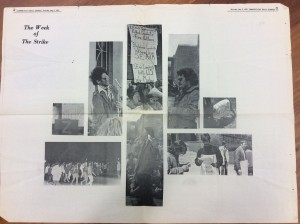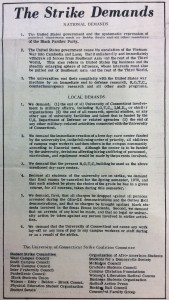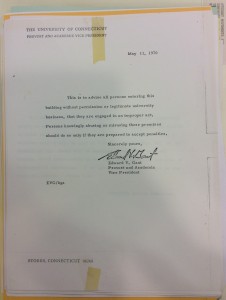In 1968 students at UConn demonstrated against the ROTC and military recruiting on campus as national uprisings began to foment against the war in Vietnam. Corporate job recruiting by General Electric and Olin Mathieson on Gilbert Rd. drew confrontations between protestors and state police along with President Homer D. Babbidge’s approach toward a business friendly posture for the university. The combative times of the UConn Crisis in 1968-1969 was the prologue to an even more eruptive year to come. Lyndon Johnson’s escalation of the war led to major backlash in the mid to late 1960s which President Nixon’s administration promised to diminish by quietly widening military campaigns into neighboring Cambodia.
Student demonstrations in over 1,250 college campuses across the country led to confrontations with local police and the national guard. On May 4th, 1970 protests at Kent State University in Ohio led to National Guardsmen firing into demonstrators killing four individuals and wounding several others. The events of 1970 galvanized much of the public’s perception on the war in Vietnam however clashes at home along class and race lines similarly disrupted any clear consensus about the war at home and abroad. The days following the Kent State shootings on the University of Connecticut campus would produce the actions of students, faculty and administration which declared 1970 as the high water mark for social upheaval. The events below were extracted from the extensive archive documented by student organizations, administration and the Daily Campus:
On May 5th College of Liberal Arts & Sciences
“In view of the atmosphere of fear and violence which currently permeates many university campuses in this country, it has become increasingly difficult to maintain normal academic procedures. Recognizing this, the faculty of the College of Liberal Arts and Sciences of the University of Connecticut finds it necessary to take the following steps:
Normal academic programs may be suspended for the remainder of the semester, so that students and faculty will not be denied the opportunity to respond in a constructive way to this ominous situation, and so that they will be free to engage in non-violent activities aimed at the ending of the United States military intervention in Southeast Asia and the systematic suppression of dissent which has already led to five deaths [sic] at Kent State University.”
- Homer Babbidge declares a Metanoia and all classes canceled on May 6th to observe “The issues dividing black and white members of the society [which] include distinctly personal aspects, their consideration seems to me to warrant a kind of personal involvement called for by Metanoia.”
- Students for a Democratic Society (SDS), many other student organizations and sympathetic faculty declare a general strike to follow the Metanoia.
Connecticut Daily Campus, Wednesday May 6th 1970.
“Deaths of 4 Kent State Students Cause New Nationwide Response” – AP
Many students across the country responded yesterday to the deaths of four students at Ohio’s Kent State University. There were marches, strikes, sit-ins and, in some cases, rocks and fire bombs. The student reaction was also sparked by the U.S. drive into Cambodia. And, for the most part, the demonstrations were peaceful. But many campuses were tense as the protests spread.
Connecticut
In Connecticut, student strikes, marches and other demonstrations were the order of business on most campuses yesterday.
At Yale a group of students objecting to ROTC training at the university ROTC building and tore down an American flag.
At UConn’s Avery Point Branch in Groton, students planned to strike yesterday and today, protesting deaths of four students at Kent State University in Ohio.
In West Hartford, UConn’s School of Social Studies was closed after a vote of students yesterday. A few hundred students then began a two-mile march to the State Capitol in Hartford. They urged Trinity and University of Hartford students to join them there.
Student solidarity at Connecticut College in New London and St. Joseph’s College in Hartford has closed most classes. A student strike spokesman at Wesleyan University in Middletown says a majority of the students participated in a strike vote yesterday. The spokesman says 20 Wesleyan faculty members have canceled classes.
At Central Connecticut State College in New Britain, a meeting of students ended with a vote by half the student body to go on strike. There was unanimity of the students that all attending classes from yesterday on would wear black armbands to protest the president’s decision to send troops into Vietnam. Some students also planned to march to the New Britain office of Congressman Thomas Meskill to show opposition to a statement he has made approving the President’s decision.
Collections on the War in Vietnam, Student Activism and Kent State Shootings are available for research at the Archives & Special Collections, Thomas J. Dodd Research Center.




A picture of the 5/11/1970 protest at the ROTC building where students painted the building in an attempt to transform it into a daycare center, appeared in an edition of the Alumni magazine about 10 years ago. I would love to see that photo again if possible.